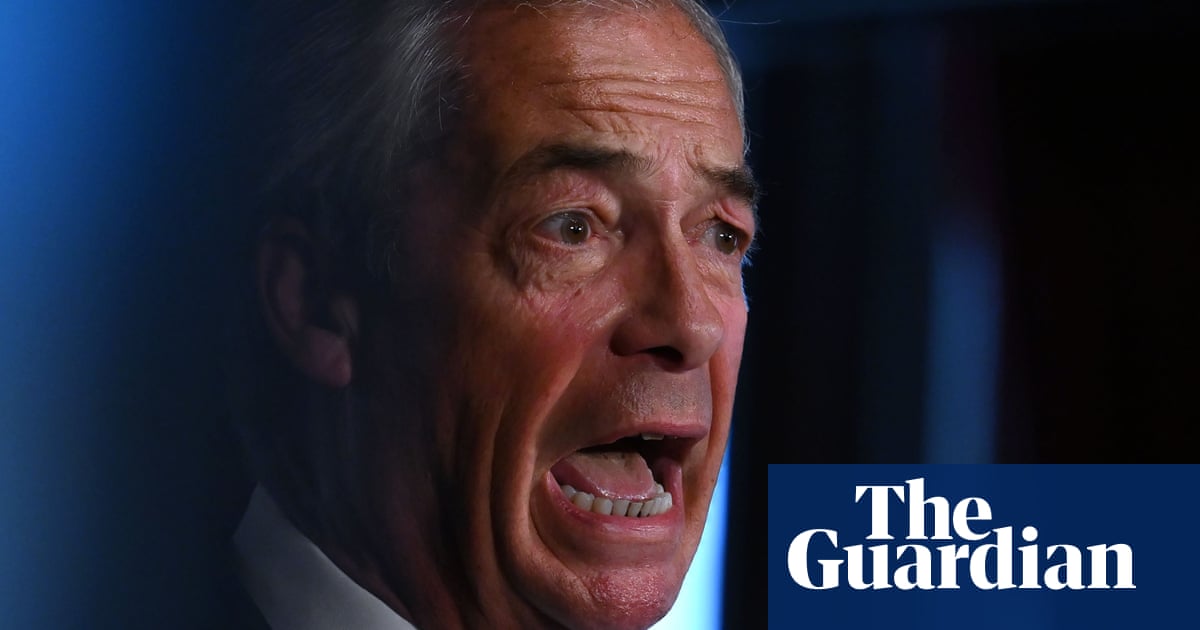Nigel Farage’s Westminster speechwas peppered with attacks on Keir Starmer, Kemi Badenoch and Rachel Reeves. One person he was nice about, however, was Angela Rayner.
“At least she’s real,” theReform UKleader said on Tuesday in response to a question about what he thinks of the firebrand deputy prime minister. “None of the rest of them are. I don’t think she’s lying on her CV [an accusation made about Reeves] – I’m not sure she’s got a CV. She is who she is.”
Rayner, the most leftwing member of Starmer’s cabinet, might seem like an unlikely bedfellow for the rightwing populist. But as ever with the Reform leader, his words were carefully chosen, as he looks to move his party’s economic platform to the left to mop up disaffectedLabourvoters.
Jonathan Ashworth, the former Labour MP, said: “The voters that powered Labour’s 2024 victory continue to highlight the state of the economy, the NHS and fair border controls as their top issues andKeir Starmermust remain doggedly focused on these priorities.
“Given the unpopularity of the original winter fuel payment decision and speculation about the future of the two-child limit it’s hardly surprisingNigel Farageis trying to make mischief for Labour.”
Andrew Fisher, Jeremy Corbyn’s former policy director, told the BBC: “You can see that it makes sense to move into more leftward territory … in order to capture some more of the vote in Wales, in the major cities that have elections, like London, and in Scotland where these things will resonate more.”
Farage’s political timing is typically deft. Starmer is under huge pressure from Labour MPs and activists to unroll both of these policies, andhas already announcedplans to undo at least some of the cuts to winter fuel payment.
But while Farage’s promise to lift the two-child benefit cap might be shared with the majority of Labour supporters, it is not motivated by entirely the same reasoning. The Reform leader said on Tuesday he was particularly concerned about low birthrates in Britain, arguing the cap might be putting people off having more babies.
His concerns are shared bymany on the populist right, including in the Trump administration, where Elon Musk previously said: “Collapsing birthrate is the biggest danger civilisation faces by far.”
Farage said on Tuesday: “We believe lifting the two-child cap is the best thing to do, not because we support a benefits culture, but because we believe for lower paid workers, this actually makes having children just a little bit easier for them.”
Whatever his motivation, the Reform leader’s distaste for the two-child cap has not been consistent. In 2015, he went into the general electionpromising thathis Ukip party would introduce exactly such a cap, arguing that doing so for new claimants constituted a “commonsense approach to benefits”.
Farage has shifted tack on important policy questions before, usually without paying a political price for doing so. The more pertinent question may be whether voters believe these promises, given the relatively vague explanation he gave for how he would pay for his new promises.
Sign up toHeadlines UK
Get the day’s headlines and highlights emailed direct to you every morning
after newsletter promotion
According to the Institute for Fiscal Studies, Farage’s pledges – which also included increased tax breaks for married couples – could end up costing as much as £80bn a year. That is only sightly less than the entire annual budget of the Department of Education.
To pay for it, Farage is promising to end the government’s commitment to net zero, scrap diversity and inclusion schemes and stop housing asylum seekers in hotels or houses of multiple occupancy. Economists said his working was riddled with errors, such as including private sector investment as part of his calculation for how much he could save by ending environmental spending.
The Reform leader insists that four years out from an election, few are worried about his party’s exact costings. “It’s difficult always to cost everything,” he said. “I think you can see very clearly the direction that we’re going in.”
But for those in Labour who are worried about their voters defecting to Reform, this is where the opportunity lies.
“Reform’s economic plan means either an explosion in borrowing, pushing up mortgage rates or swingeing cuts in public services like the NHS,” Ashworth said. “Given this is terrain Labour want to fight an election on, Reform have just walked into a trap and Labour strategists will be rubbing their hands with glee.’
